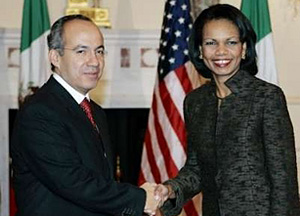 |
 |
 |
 Editorials | Issues | November 2006 Editorials | Issues | November 2006  
Democrat-Controlled U.S. Congress a Mixed Bag for Mexico
 Kenneth Emmond - MexiData.info Kenneth Emmond - MexiData.info


| | U.S. Secretary of State Condoleezza Rice (R) greets Mexico's President-elect Felipe Calderon at the State Department in Washington November 9, 2006. (Reuters/Larry Downing) |
What are Mexicans to make of last Tuesday’s U.S. mid-term election results? What’s likely to happen to outstanding issues with the Democrats in control of both the House of Representatives and the Senate?

Like American voters commenting with their ballots on issues like the Iraq war, Hurricane Katrina and the economy, Mexicans have been disappointed with the execution of the policies articulated by U.S. President George W. Bush.

None is more disappointed than outgoing President Vicente Fox. After warm initial Fox-Bush encounters in 2001, Mexico has been pretty much left out in the cold since September 11 of that year.

Bush’s neighborly promises were renewed in 2004 when he wooed the Hispanic-American vote. However, instead of improving relations as promised, Bush focused on Iraq, Katrina, and other issues, and U.S.-Mexican relations continued to deteriorate.

Politicians on both sides of the border made nasty, unconstructive comments, especially over illegal immigration and ongoing problems with Mexican drug gangs supplying the world’s largest narcotics market.

By the time the last session of Congress ended, Mexicans were left watching passage — and signing into law by the President — of a bill to build a 700 mile wall along what’s supposed to be a friendly border.

That may have shored up the hardline anti-immigrant vote, most of which was Republican anyway, but Republicans paid a steep price.

Hispanic-Americans responded by turning out to vote in unexpected numbers. Nearly three-quarters of them voted Democrat, up from 55 percent in 2004. They were likely a deciding factor in some close races.

Will a Democrat-controlled Congress be friendlier to Mexico than a Republican one?

Despite high hopes inspired by the congressional regime change that remains to be seen. Although former President Bill Clinton, a Democrat, signed the North American Free Trade Agreement (NAFTA) in 1993, Democrats have shown themselves to be more protectionist than Republicans.

Democrats worry more about job losses arising from free trade. As well, they will likely make it harder for the administration to curb agricultural subsidies, not a good sign for Mexican farmers. On the other hand, they tend to seek practicable, workable solutions to illegal immigration.

Don’t expect a sea change in the new Congress. Nancy Pelosi, who will be Speaker in the House of Representatives, says she’ll follow tradition by naming committee chairpersons by seniority.

That means there will be lots of tired old faces. Based on seniority, seven of the 19 chairmen-to-be are more than 70 years old — hardly a harbinger of fresh new ideas.

How that plays out in terms of bilateral trade remains a question mark, but Mexico has reason to hope for better things on the issues of immigration and narco-crime.

We may have a hint of how Mexico responds to the new American political landscape from President-elect Felipe Calderon’s two-day visit to Washington last week.

Before the meetings began he spoke of a “new relationship” between the two nations and of “building bridges of progress and not walls that isolate and divide us.”

Calderon did not meet with members of the new Congress but he got a warm welcome from the administration.

When he visited Bush on Thursday, he was invited into the Oval Office, a privilege normally reserved for acting heads of state. In addition, his scheduled half-hour appointment, following a breakfast with Secretary of State Condoleezza Rice and three other cabinet members, stretched to almost an hour.

During their meeting, Calderon and Rice agreed to review the NAFTA accord with an eye to alleviating the problems it causes Mexican bean and corn producers.

Calderon, who with each day looks much more the diplomat-negotiator than his Lone Ranger predecessor, said he and Rice “agreed to begin meetings to start a dialog between the two governments” after he assumes power on December 1.

The visit provides at least a suggestion of future access to America’s decision-makers.

The mid-term elections provide some new opportunities for Mexico’s incoming administration, although they don’t point to an entirely new ball game. As well, there will likely be a lot of fudging as Democrats angle for position for the 2008 presidential elections.

Still, if Calderon is the conciliator he appears to be, if the Bush administration isn’t distracted by new attention-grabbing crises, and if Bush can cure himself of his propensity to listen too hard to lobby groups, there’s room for optimism that U.S.-Mexico relations will improve over the next two years, and that there will be progress on some of the problems.

Kenneth Emmond, an economist, market consultant and journalist who has lived in Mexico since 1995, is also a columnist with MexiData.info. He can be reached via email at Kemmond00@yahoo.com. | 
 | |
 |



